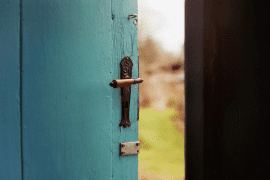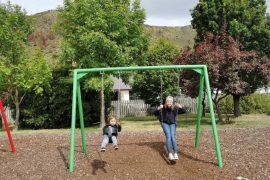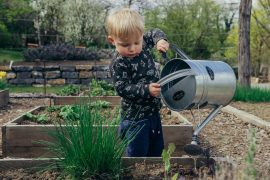5. Offer Support and Model Win-Win Solutions
“I know your little sister gets on your nerves sometimes, and she always wants to play with your things. That’s really annoying to you. You deserve to be able to keep your treasures safe. But it isn’t okay to yell at your sister or hit her. Why don’t we work together to find a safe place for your treasures where your sister can’t get at them? And if you start getting annoyed at her, what can you do instead of yelling?”
6. Keep setting limits
You become more flexible as you see it from your child’s point of view more often, and that’s a good thing. But you’ll still need to set plenty of limits. The key is to set the limit BEFORE you get angry, while you still have a sense of humour and can empathise with his perspective. “You wish you never had to stop playing and get ready for bed, don’t you? I bet when you grow up, you’ll play all night every night, won’t you?! And right now, it’s time for your bath.”
Acknowledging your child’s perspective as you set the limit is what helps them cooperate with you.
7. Teach reparations
If you’ve been punishing, you’ll feel unfinished if your child breaks a rule and you don’t punish him. So train yourself to think in terms of repair, instead.
After everyone has calmed down and is feeling reconnected, have a private discussion with your child about what happened. Be patient, listen, and really empathise. That’s what will help him past it. ”You were pretty mad when he did that…I hear you.”
Resist the urge to teach until after your child has opened up to show you all that upset that caused him to act out. Then, point out the cost of his actions, being careful not to shame or blame. “When you said that to your brother, it really hurt his feelings….I wonder if it made him not feel as close to you.”
Ask your child if there is anything he can do to repair the damage. “I wonder what you could you do to repair things with your brother?
Resist the urge to punish or force an apology. Instead, empower your child to see that he can repair his mistakes. “You know we always clean up our own messes, right? This is just a different kind of mess, like spilled milk. I know you’ll think of just the right thing to make things better with your brother….I can’t wait to see what it is.”
Just as with matter-of-factly cleaning up the spilled milk, the process of cleaning up his messes will teach him that he doesn’t want to cause those hurts to begin with. Just remember that this isn’t a punishment. It’s his choice.
What if he resists? That means that he needs more help from you to heal his upset before he can move on to repair.
Double-check to be sure you aren’t lecturing, and that you’re really seeing his perspective. If old resentments are creating a chip on his shoulder, then make a commitment to yourself to start the repair work today to melt those resentments.
8. Expect emotions
When children are punished, they learn that those big emotions that drive them to misbehave get them into trouble, so they try to stuff those “bad” feelings down. That doesn’t work, of course. The jealousy, frustration and need are still there in your child’s emotional backpack, popping out at the slightest provocation. The only reason your child keeps them under wraps is because she’s afraid. So once you stop punishing, those emotions are bound to bubble up to get healed.
Acting out is not a personal challenge to you. When your child “acts out” she is acting out feelings that she can’t express in words.
Like “All those times you yelled at me, and I was so scared…I acted like I didn’t care, but I was terrified inside….That fear is still inside me and it eats away at me and feels awful….So I lash out to keep those feelings down.” No child could tell you that, so she acts out. Train yourself to see misbehaviour as a cry for help. Emotions are never the problem; humans will always have big emotions. And, of course, that doesn’t give her license to hurt anyone else. The key is to help your child work through the hurts and fears that are under her anger, so they no longer drive her behaviour.
How do you help your child with those emotions? Connection, laughter and tears. For more guidance on how to do this: Preventive Maintenance for Kids.










